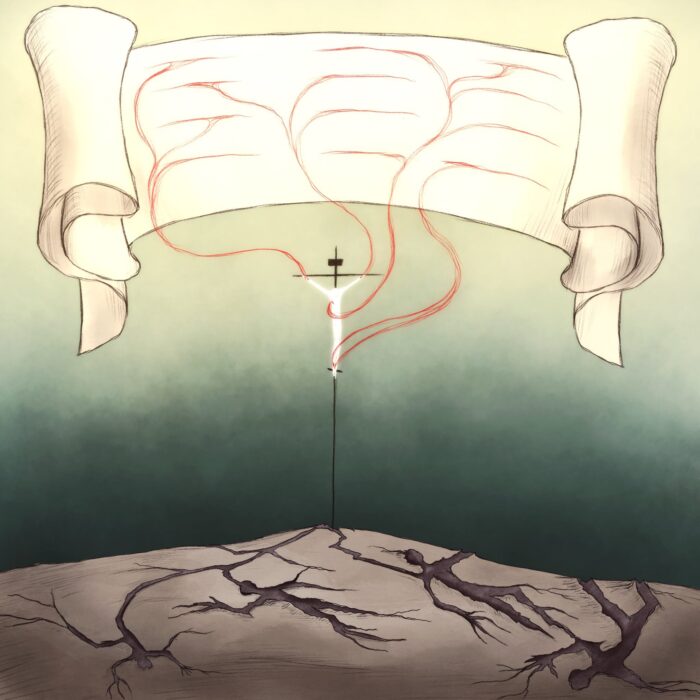
Luke 1:52, “He has brought down the mighty from their thrones and exalted those of humble estate.”
Short Thoughts:
Through the crucified and risen Son, God shatters the foundation of every human power and lifts the humbly dependent to Himself.
Long Thoughts:
This picture was actually based on Psalm 107:40-41, 43….however, once I’d finished in I thought that Luke 1:52 gave a more succinct summary. Ultimately both Luke and the psalmist (along with many other places of scripture) are pointing to the same reality in the character of YHWH. Below are my thoughts on these things from this morning’s journal….
Psalm 107:43, “Whoever is wise, let him attend to these things; let them consider the steadfast love of YHWH.”
At the conclusion of a Psalm built around four vignettes of YHWH’s salvation of the hopeless and undeserving who call upon His name, the wise are called to “attend to these things.” One would assume the “these things” are the accounts that have been given in the psalm, and no doubt they are included, but the “these things” seems most immediately addressed to verses 33-42 where we read something of an overview of the things that YHWH does, of which the psalm’s four vignettes have been instances.
In these verses we see the way that the Lord’s care for the poor and needy and afflicted expresses itself as a reversal of human expectations, a reversal of the man-centered status quo…..He turns rivers into deserts and fruitful lands into salty wastes….as well as turning deserts to pools of water and parched land into springs. But these works of YHWH are not “magic tricks”, He does not bring reversal for reversal’s sake, no, in the desert-turned-garden He “lets the hungry dwell.” And we read later that He “pours contempt on princess…but He raises up the needy out of affliction.” The transformation of oasis to desert and wasteland to fruitful ground is a picture of the greater reversal that He works in the world, namely the tearing down of the proud and the exaltation of the humble.
It seems, then, that—while the entire Psalm is included in the “these things” to which the wise attend—verses 33-42 seems especially in focus. The wise ought to consider how YHWH is ready to turn the “way things are” upside down in order to save the lowly ones who trust in His Name (indeed, each of the vignettes can be said to be an instance of YHWH breaking in and reversing the “way things are” on behalf of those who admit their neediness by calling on His Name in hopeful desperation).
But then, in the second half of verse 43 we get to the essence of the command: “let them consider the steadfast love of YHWH.” These things—YHWH’s readiness to work miraculous reversals for the needy ones who call on His name—are here summarized as “the steadfast love of YHWH.” That is awesome to see. Many things can and must be said about the Lord’s steadfast love—not least of which being the central place that it holds in the expression of His Name—but here at least we can say that the steadfast love of YHWH is that which motivates Him to move heaven and earth, as it were, for the good of those who cast themselves wholly and only on Him; for the good of those who call in desperation on His name alone out of the depths of their need; for the good of those who—beyond all hope—cry out to Him.
The wise—the Holy Spirit tells us—the wise will consider these things. Wisdom (which is the fear of YHWH) will muse over, contemplate, meditate upon, and—therefore—depend upon the steadfast love of YHWH. That’s interesting because it lines right up with what we read back in Psalm 33:16,
The eye of YHWH is on those who fear Him; on those who hope in His steadfast love.
So the wise (that is, those who fear YHWH) will consider (and therefore hope in) the steadfast love of YHWH. Wisdom….wisdom from above, real, true, life-navigating wisdom spends its energies musing over the historic instances of YHWH’s steadfast love, historic acts that bear witness to eternal fact.
But, of course, this means that the main diet of wisdom in this age must be the gospel of the crucified and risen Lord. Yes, if wisdom contemplates the steadfast love of YHWH, then—post cross—wisdom contemplates the gospel of the glory of Christ, the word of the cross, the good news of the incarnate Son who dies and rises again. THIS is where the steadfast love of the Lord arrives at its zenith. THIS is where we see the supreme “reversal” worked on behalf of the helpless ones who cast themselves on YHWH alone….yes, THIS is where we see Heaven descend to the depths of the earth, where we see the Holy One bear the pollution of His people, where we see the Covenant Lord bear the Covenant Curses, where we see the eternally beloved one who is ever and always in the bosom of the Father exiled into outer darkness on behalf of His enemies that they might become His friends. Does wisdom “consider the steadfast love of YHWH”? Then wisdom considers—above all else—the cross.
And I will say here too at the very end……this is not a disconnected contemplation, this is not an academic exercise……to consider the cross, to consider the steadfast love of YHWH, to attend to this most beautiful of narratives by which we know the most beautiful of Names…..to consider these things means that we then go out into life HOPING IN THIS (again, Ps.33:16). It means that we enter this world—this world shot through with loss and sorrow and death and sickness and darkness and violence and suffocating tragedy—it means we enter this world with the steadfast love of YHWH (which is to say, with the crucified and risen Jesus ) as out interpretive key, as our North Star, as our hermeneutic for understanding the sentences of life that we are reading moment by moment throughout our lives.
Wisdom believes and remembers and hopes in the truth that this world of death is authored by, submitted under, and conforming to the God whose supreme self-revelation comes in the one who dies….and rises again…..Wisdom anchors its all on the proven fact that, when the universal reversal which echoes the individual reversal of Christ’s resurrection—that when it comes, it will be final salvation and joy beyond bearing for the hungry, for the needy, for the bowed down and afflicted who have—in all their difficulty—cried to YHWH.




